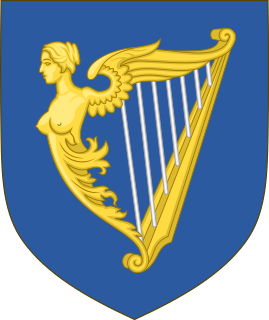
The Irish House of Commons was the lower house of the Parliament of Ireland that existed from 1297 until 1800. The upper house was the House of Lords. The membership of the House of Commons was directly elected, but on a highly restrictive franchise, similar to the unreformed House of Commons in contemporary England and Great Britain. Catholics were disqualified from sitting in the Irish parliament from 1691, even though they comprised the vast majority of the Irish population.
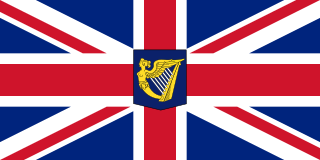
Southern Ireland was the larger of the two parts of Ireland that were created when Ireland was partitioned by the Government of Ireland Act 1920. It comprised 26 of the 32 counties of Ireland or about five-sixths of the area of the island, whilst the remaining six counties in the northeast of the island formed Northern Ireland. Southern Ireland included County Donegal, despite it being the largest county in Ulster and the most northerly county in all of Ireland.
The Irish Oath of Allegiance was a controversial provision in the Anglo-Irish Treaty of 1921, which Irish TDs and Senators were required to swear before taking their seats in Dáil Éireann and Seanad Éireann before the Constitution Act 1933 was passed on 3 May 1933. The controversy surrounding the Oath was one of the principal issues that led to the Irish Civil War of 1922–23 between supporters and opponents of the Treaty.

The Acts of Union 1800 were parallel acts of the Parliament of Great Britain and the Parliament of Ireland which united the Kingdom of Great Britain and the Kingdom of Ireland to create the United Kingdom of Great Britain and Ireland. The acts came into force on 1 January 1801, and the merged Parliament of the United Kingdom had its first meeting on 22 January 1801.
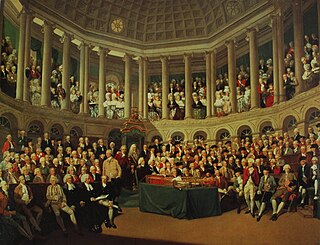
The House of Commons is the name for the elected lower house of the bicameral parliaments of the United Kingdom and Canada. In the UK and Canada, the Commons holds much more legislative power than the nominally upper house of parliament. The leader of the majority party in the House of Commons by convention becomes the prime minister. Other parliaments have also had a lower house called a "House of Commons".

Parliament House in Dublin, Ireland, was home to the Parliament of Ireland, and since 1803 has housed the Bank of Ireland. It was the world's first purpose-built bicameral parliament house. It is located at College Green.
Chuck, Charlie or Charles Stewart may refer to:
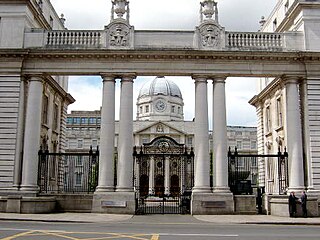
The Parliament of Southern Ireland was a Home Rule legislature established by the British Government during the Irish War of Independence under the Government of Ireland Act 1920. It was designed to legislate for Southern Ireland, a political entity which was created by the British Government to solve the issue of rising Irish nationalism and the issue of partitionism, whilst retaining the whole of Ireland as part of the United Kingdom.

The Parliament of Ireland was the legislature of the Lordship of Ireland, and later the Kingdom of Ireland, from 1297 until 1800. It was modelled on the Parliament of England and from 1537 comprised two chambers: the House of Commons and the House of Lords. The Lords were members of the Irish peerage and bishops. The Commons was directly elected, albeit on a very restricted franchise. Parliaments met at various places in Leinster and Munster, but latterly always in Dublin: in Christchurch Cathedral, Dublin Castle, Chichester House (1661–1727), the Blue Coat School (1729–31), and finally a purpose-built Parliament House on College Green.
Speaker of the House of Commons is a political leadership position found in countries that have a House of Commons, where the membership of the body elects a Speaker to lead its proceedings.

Ireland is an island in Western Europe, located to the west of the island of Great Britain.
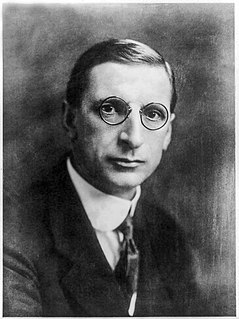
Two elections in Ireland took place in 1921, as a result of the Government of Ireland Act 1920 to establish the House of Commons of Northern Ireland and the House of Commons of Southern Ireland. The election was used by Irish Republicans as the basis of membership of the Second Dáil. Where contested, the elections used single transferable vote.

Ireland was part of the United Kingdom of Great Britain and Ireland from 1801 to 1922. For almost all of this period, the island was governed by the UK Parliament in London through its Dublin Castle administration in Ireland. Ireland underwent considerable difficulties in the 19th century, especially the Great Famine of the 1840s which started a population decline that continued for almost a century. The late 19th and early 20th centuries saw a vigorous campaign for Irish Home Rule. While legislation enabling Irish Home Rule was eventually passed, militant and armed opposition from Irish unionists, particularly in Ulster, opposed it. Proclamation was shelved for the duration following the outbreak of World War I. By 1918, however, moderate Irish nationalism had been eclipsed by militant republican separatism. In 1919, war broke out between republican separatists and British Government forces. Subsequent negotiations between Sinn Féin, the major Irish party, and the UK government led to the signing of the Anglo-Irish Treaty, which resulted in five-sixths of Ireland seceding from the United Kingdom.

In the United Kingdom (UK), each of the electoral areas or divisions called constituencies elects one member to the House of Commons.
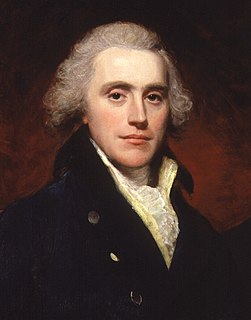
In the first Parliament to be held after the Union of Great Britain and Ireland on 1 January 1801, the first House of Commons of the United Kingdom was composed of all 558 members of the former Parliament of Great Britain and 100 of the members of the House of Commons of Ireland.
Elections in Ireland may refer to:

The Irish Home Rule movement was a movement that campaigned for self-government for Ireland within the United Kingdom of Great Britain and Ireland. It was the dominant political movement of Irish nationalism from 1870 to the end of World War I.
St George Daly was an Irish judge, who had a reputation for ignorance of the law. He owed his career advancement entirely to his support for the Act of Union 1801, which did nothing to enhance his reputation among the legal profession.
This page is based on this
Wikipedia article Text is available under the
CC BY-SA 4.0 license; additional terms may apply.
Images, videos and audio are available under their respective licenses.










